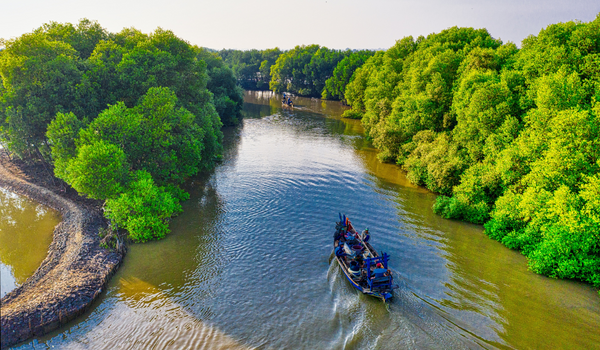Water is often neglected in political conversations. Thankfully, 2022 has seen much greater recognition of the importance of protecting and managing our precious water resources. In November, world leaders met at COP27 in Egypt, where they finally recognised the critical role water systems have in delivering climate mitigation and urged parties to integrate water into their adaptation efforts. The following month, UN Member States agreed to a landmark agreement in Montreal that at least 30 percent of terrestrial, inland water, coastal, and marine areas will be effectively conserved by 2030.
As necessary as these bold commitments and agendas are, concrete action to unlock cross-sectoral collaboration and mobilise effective water management remains imperative if the world is to meet these ambitious goals.
Highlights of 2020-2022: SDG 6 IWRM Support Programme continued to assist countries to enhance IWRM implementation
Currently, the world is not on track to meet the Sustainable Development Goals (SDGs) by 2030. The global score of SDG indicator 6.5.1 – which measures the degree of implementation of integrated water resources management (IWRM) – increased from 49 percent in 2017 to 54 percent in 2020. Although this is positive, it represents a rate of progress that must double if it is to reach the SDG 6 targets.
The SDG 6 IWRM Support Programme aims to improve this global score by supporting countries to 1) monitor the progress of SDG 6.5.1 on implementing IWRM and identifying challenges, 2) formulate responses to these challenges, and 3) implement concrete actions to accelerate implementation.
In 2022, for example, GWP used its Support Programme to assist the governments of Panama, Nicaragua, Nepal, and Tanzania in creating IWRM Action Plans. These plans serve as national response strategies, with attractive investment opportunities to enhance the management and governance of water. Implementing these plans will allow the countries to see measurable progress when next they monitor the status of SDG 6.5.1.
GWP has now initiated the same process in Bangladesh, Botswana, North Macedonia, Paraguay and Tunisia, which is expected to conclude in 2023. The Support Programme has also developed materials to guide countries, including updating the Acceleration Package, which explains how to develop an IWRM Action Plan, and a multi-lingual online course on IWRM action planning.
Working with stakeholders for improved water resource management
Another highlight of 2022 has been GWP’s support for implementing actions to leverage additional resources and mobilise stakeholders. In Tanzania, the Ministry of Water engaged GWP to answer a simple but challenging question: how much does water contribute to Tanzania’s economy? In collaboration with the Ministry of Water, the Support Programme has begun analysing available data on water use and derived economic benefits in a limited number of sectors. The work, due to conclude in 2023, has a high degree of stakeholder involvement and has been well received. The results will be presented to the Ministry of Finance to make a case for increasing the future budget for the water sector.
GWP also launched a pilot of the Funding Matchmaking Initiative in Kenya and Guatemala, where both countries were supported to create mechanisms for the protection, conservation, and improvement of water resources and strengthened partnerships to properly manage water resources in selected basins. In Kenya, this resulted in the development of four bankable investment packages for the Upper Athi Catchment worth US$15.45 million. The Kenyan government committed to matching funds up to US$18 million in the national budget for 2023.
“Local stakeholders received the initiative with great interest, and we have seen the first commitments formulated by the private sector to support the protection and restoration of the Upper Athi Catchment,” said George Sanga, Regional Coordinator of GWP Eastern Africa. “This is expected to support local development and improve the state of our precious water resources in that important catchment. The approach has also gained interest in neighbouring countries such as Uganda, which has requested GWP for support in replicating the initiative.”
Discover more highlights and results from the SDG 6 IWRM Support Programme in its triennial progress report.
Reporting on SDG indicators in 2023
As we enter a new year, we will see the water community continue to mobilise governments, civil society, academia, NGOs, and the private sector to foster collective action on water issues. The UN Water Conference in March is a vital opportunity to ensure bold commitments to water for sustainable development, restoring and protecting biodiversity, and climate adaptation and mitigation. In July, the UN High-Level Political Forum will review progress towards SDG 6 on clean water and sanitation.
2023 is also a critical reporting year, when countries will detail their progress on SDG indicators. Through the Support Programme, GWP and its partners will help countries report on SDG indicator 6.5.1. The official reporting process is expected to be launched by the UN Environment Programme (UNEP) in April.
“We can only sustainably manage what we measure, and this reporting round will further inform evidence-based decision-making at global and national levels to set the right priorities,” explains Joakim Harlin, Chief of the Freshwater Ecosystems Unit at UNEP and Chief Manager of the UNEP-DHI Centre on Water and Environment. “Achieving SDG 6 and its targets is essential for sustainable development, climate action, biodiversity, peace, and human wellbeing, and we have no time to waste.”

